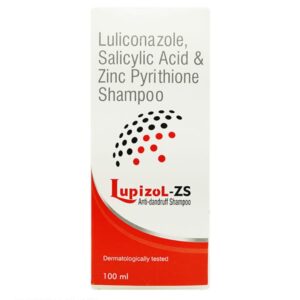SALICYLIC ACID + ZINC PYRITHIONE + LULICONAZOLE
Salicylic Acid: Salicylic Acid is a medication primarily used for the treatment of various skin conditions such as acne, dandruff, psoriasis, and warts. It belongs to a class of drugs known as keratolytics, which work by helping the skin to shed dead cells more effectively.
The mechanism of action of Salicylic Acid involves its ability to soften and dissolve the outer layer of the skin, which helps to unclog pores and promote the shedding of dead skin cells. This action helps to reduce inflammation and improve the appearance of the skin.
Salicylic Acid is available in different formulations, including creams, gels, lotions, shampoos, and ointments. The dose and frequency of use depend on the specific formulation and the condition being treated. It is important to follow the instructions provided by the healthcare professional or the product label.
Common side effects of Salicylic Acid include skin irritation, stinging, burning, redness, or dryness at the application site. These side effects are usually mild and temporary. However, if any severe or persistent side effects occur, it is recommended to seek medical attention.
It is important to note that Salicylic Acid should not be used on broken or infected skin, and it is not recommended for use by pregnant or breastfeeding women without consulting a healthcare professional. Additionally, individuals with allergies to aspirin should exercise caution when using Salicylic Acid as they may be allergic to it as well.
Overall, Salicylic Acid is a widely used medication for various skin conditions. However, it is advisable to consult a healthcare professional before using it to ensure its appropriateness for your specific condition and to discuss any potential risks or contraindications.
Zinc Pyrithione: Zinc Pyrithione is a medication used primarily in the treatment of dandruff and other scalp conditions, such as seborrheic dermatitis. It is available in the form of shampoos, creams, lotions, and soaps.
The exact mechanism of action of Zinc Pyrithione is not fully understood. However, it is believed to work by inhibiting the growth of certain fungi and bacteria that contribute to scalp conditions like dandruff. It is also thought to have anti-inflammatory properties that help reduce itchiness and redness on the scalp.
The dose and frequency of Zinc Pyrithione use vary depending on the specific product and severity of the condition being treated. Generally, for shampoo use, it is recommended to apply the product to wet hair, lather it, and leave it on the scalp for a few minutes before rinsing thoroughly. This can be done 2-3 times a week or as directed by a healthcare professional.
Common side effects of Zinc Pyrithione are rare but may include skin irritation, itching, and redness. If these side effects persist or worsen, it is advisable to discontinue use and consult a healthcare professional.
It is important to note that while Zinc Pyrithione is generally safe for topical use, it should not be ingested. If accidental ingestion occurs, immediate medical attention should be sought. Additionally, it is always recommended to follow the instructions provided by the healthcare professional or on the product label for proper use and dosage.
Luliconazole: Luliconazole is an antifungal medication primarily used for the treatment of fungal infections of the skin, such as athlete’s foot (tinea pedis), jock itch (tinea cruris), and ringworm (tinea corporis). It belongs to the class of drugs known as azole antifungals.
The mechanism of action of Luliconazole involves inhibiting the synthesis of ergosterol, a key component of the fungal cell membrane, which leads to disruption of the membrane and ultimately the death of the fungus.
Luliconazole is available as a topical cream or solution and is usually applied once daily to the affected area of the skin. The duration of treatment can vary depending on the severity of the infection, but the usual course is around 2 to 4 weeks.
Like any medication, Luliconazole can have some side effects. The most common side effects include itching, burning, irritation, or stinging at the application site. These side effects are generally mild and temporary. In rare cases, more serious and uncommon side effects such as allergic reactions, severe skin reactions, or skin discoloration may occur. If any of these side effects occur, it is important to seek medical attention.
It’s worth noting that Luliconazole may interact with certain other medications, so it is essential to inform your healthcare provider about all the medications you are taking to avoid any potential drug interactions.
Overall, Luliconazole is an effective antifungal medication used for the treatment of various fungal infections of the skin. It works by inhibiting fungal growth and is usually applied topically once daily. While it is generally well-tolerated, it is important to be aware of the potential side effects and to seek medical advice if necessary.

